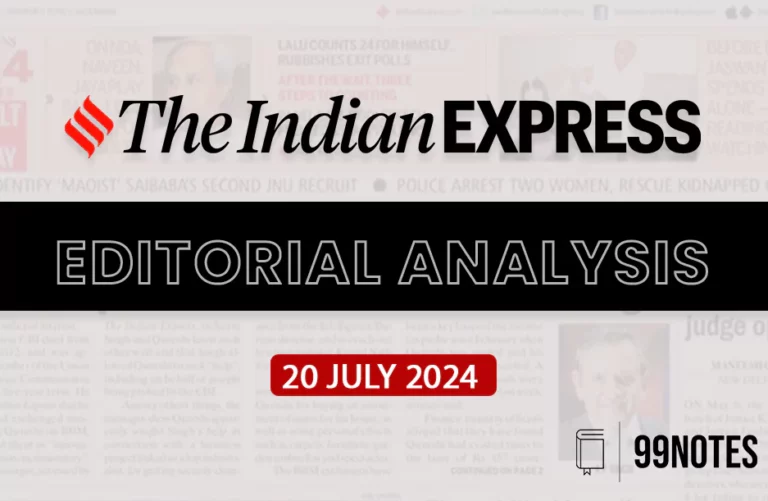21 June 2023 : Indian Express
Indian Express
21-June-2023
The Indian Express, CSE candidates can stay informed about current events and developments in India and around the world.
1. Heatwave deaths: Why a heatstroke kills, and how to stay safe
Syllabus – GS III
Recent Context – Heatwave in several parts of India has led to high death toll.
What is Heatwave?
-
Qualitatively, heat wave is a condition of air temperature that becomes fatal to human body when exposed.
-
Quantitatively, it is based on the temperature thresholds over a region in terms of actual temperature or its departure from normal.
-
Heatwave is considered if the maximum temperature of a place reaches at least 40 degree Celsius or more for plains and at least 30 degree Celsius or more for hilly regions.
-
Based on departure from normal :
Heatwave – Departure from normal is 4.5 degree Celsius to 6.4 degree Celsius
Severe heat wave – Departure from normal is >6.4 degree Celsius
Based on Actual Maximum Temperature :
Heatwave – When the actual maximum temperature is greater than or equal to 45 degree Celsius
Severe heat wave – When the actual maximum temperature is greater than or equal to 47 degree Celsius
If the above criteria are met at least in 2 stations in a Meteorological sub-division for at least two consecutive days, it is declared a heat wave.
Impact on body
-
The body will feel drained out of energy, referred to as heat exhaustion.
-
It happens on account of excessive sweating.
-
A heat stroke happens when the ambient temperature is so high that the body is unable to sweat to regulate the core temperature, which shoots up to 40 degrees Celsius.
-
It can lead to kidney and liver damage and severely impact the brain.
Remedy
-
Emphasis on bringing down the core temperature of the body fast.
-
Pouring cold water over the person, giving cool drinks and electrolytes to balance salt levels.
-
A person should be taken to a hospital immediately if they are exhibiting these symptoms; their body temperature is very high, but they are not sweating at all, they are feeling drowsy, they are vomiting, they are not passing urine, and they are not breathing properly.
-
Avoid stepping out in direct sunlight.
-
Do not consume alcohol, tea, coffee and carbonated soft drinks, as they can dehydrate further.
-
Wear light-weight, light-coloured, loose and porous cotton clothes and wear goggles, umbrellas and shoes.
2. India’s heat action plans fail to Identify and target vulnerable groups: Report
Syllabus – GS III
Recent Context – Rising temperature and problems arising due to it
Heat Action Plans
-
HAPs are the primary policy response to economically damaging and life-threatening heat waves. They prescribe a number of activities, disaster responses and post-heat wave response measures to reduce the impact of heat waves.
-
They can bring down mortality due to intense heat.
-
Indian Institue of Public Health, Gandhinagar, developed one of the first heat action plans in the country for Ahmedabad resulting in 30% – 40% reduction in mortality in the city.
Recommendations
-
There is a need for the world to reduce emissions in the next two decades to prevent warm temperatures.
-
There is a need for HAPs to identify sources of financing, either from new funds or by combining actions with existing national and state policies and set up rigorous independent evaluations as a basis for constant improvement.
-
Without implementation-oriented HAPs, India’s poorest will continue to suffer from extreme heat, paying with both their health and incomes.
3. At Bonn climate meet, old conflicts – and some forward movement
Syllabus – GS III
Recent Context – The Bonn climate change conference that finished last week was built up as an opportunity for course correction. Current global efforts to keep rising temperatures in check are abysmally inadequate.
Important Aspects
-
Just like the more famous year-ending climate conferences, Bonn underperformed.
-
Developed and developing countries bickered on issues old and new and could not even agree on the agenda of one of the meetings till the penultimate day.
Global Stocktake (GST)
-
Countries managed to wrap up third and final round of technical discussions on global stocktake.
-
Mandated by the 2015 Paris Agreement, GST is an exercise aimed at assessing the progress in the fight against climate change and deciding ways and means to enhance global action to bridge the adequacy gap.
-
As per Paris Deal, it is supposed to be conducted every five years, starting in 2023.
Bone of contention
-
Historical responsibility and common but differentiated responsibility.
-
A statement from Australia seeking to downplay the historical responsibility in causing global warming of developed countries annoyed developing countries.
Arguments of Australia
-
It pointed out that since 1992, about 57% of the carbon dioxide emissions had come from non-Annex I countries.
-
It said that 70% of the incremental warming since 1992 due to carbon dioxide, methane and sulphur dioxide emissions had come from non-Annex I countries.
Mitigation Work Programme
-
Another mechanism was set up at COP26 in Glasgow in 2021 for climate action.
-
It is a temporary emergency exercise focused only on increasing emission cuts.
-
Global emissions must come down by 43% from 2019 levels by 2030 to keep alive hopes of meeting the 1.5-degree target.
Trouble
-
Developing countries complained that while being asked to strengthen their climate actions, developed countries were yet to offer the enabling finance and technology transfers.
-
According to one assessment, developing countries need as much as US $ 6 trillion between now and 2030 to implement their climate action plans.
-
Developed countries are under an obligation to support the implementation of climate action plans.
-
Developing countries’ loss and damage needs are assessed to be about US $ 400 billion every year.
-
$ 100 billion per year committed by developed countries from 2020 is insufficient, and even that is not fully available.
Way Forward
-
A fresh start at raising financial resources for climate change is being made in Paris this week with a two-day meeting several heads of state are slated to attend.
-
The Summit for a New Global Financial Pact attempts to redirect global financial flows and raise new money to fight climate change and deal with associated problems like biodiversity loss and poverty.
4. Desertification and Drought Day 2023
Syllabus – GS III
Recent Context – World Day to combat desertification and drought is observed every year on the 17th of June.
Theme
‘’Her Land, Her Rights’’ focuses on women’s land rights, which are essential for achieving the interconnected global goals of gender equality and land degradation neutrality by 2030 and contributing to the advancement of several other Sustainable Development Goals (SDGs).
Background
-
Desertification, climate change, and biodiversity loss were identified as the greatest challenges to sustainable development during the 1992 Rio Earth Summit.
-
Two years later, in 1994, the UN General Assembly established the United Nations Convention to Combat Desertification (UNCCD), the sole legally binding international agreement linking environment and development to sustainable land management and declared 17 June ‘’World Day to Combat Desertification and Drought’’.
-
In 2007, the UN General Assembly declared 2010-2020 the United Nations Decade for Deserts and the fight against Desertification.
For Enquiry

21 June 2023 : Indian Express

21 June 2023 : PIB

21 June 2023 : The Hindu Editorial

21 June 2023 : Daily Current Affairs

20 June 2023 : Indian Express

20 June 2023 : Daily Quiz

20 June 2023 : PIB

20 June 2023 : The Hindu Editorial

20 June 2023 : Daily Current Affairs

19 June 2023 : Indian Express
Indian Express 21 June 2023 : Indian Express Indian Express
21-June-2023
The Indian Express, CSE candidates can stay informed about current events…
PIB 21 June 2023 : PIB PRESS INFORMATION BUREAU
21-June-2023
Daily Current Affairs For UPSC ,The PIB ( Press Information Bureau…
The Hindu 21 June 2023 : The Hindu Editorial The Hindu Editorial
21-June-2023
Daily Current Affairs For UPSC ,The Hindu Editorial Summary
Facebook-f
Twitter
Youtube…
Daily Current Affairs 21 June 2023 : Daily Current Affairs DAILY CURRENT AFFAIRS
21-June-2023
Daily Current Affairs For UPSC ,Daily Current affairs of The hIndu…
Indian Express 20 June 2023 : Indian Express Indian Express
20-June-2023
The Indian Express, CSE candidates can stay informed about current events…
Daily Quiz 20 June 2023 : Daily Quiz 20 June 2023 : Daily Quiz…
PIB 20 June 2023 : PIB PRESS INFORMATION BUREAU
20-June-2023
Daily Current Affairs For UPSC ,The PIB ( Press Information Bureau…
The Hindu 20 June 2023 : The Hindu Editorial The Hindu Editorial
20-June-2023
Daily Current Affairs For UPSC ,The Hindu Editorial Summary
Facebook-f
Twitter
Youtube…
Daily Current Affairs 20 June 2023 : Daily Current Affairs DAILY CURRENT AFFAIRS
20-June-2023
Daily Current Affairs For UPSC ,Daily Current affairs of The hIndu…
Indian Express 19 June 2023 : Indian Express Indian Express
19-June-2023
The Indian Express, CSE candidates can stay informed about current events…



